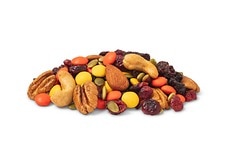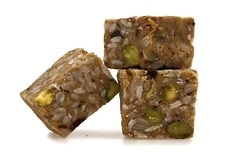Benefits of Pumpkin Seeds
Pumpkins are indigenous to the Americas but soon became popular throughout the world as a snack food. Sometimes called “pepitas,” (the Spanish word for pumpkin seed) pumpkin seeds are well known for their nutritional benefits. In fact, the Aztec culture of central Mexico cultivated pumpkins since 6000 B.C., prizing the squash for its delicious seeds (Graber, 2003).
Today, pumpkin seeds make a convenient and tasty snack food that delivers a host of benefits. One of their best features is their versatility; they are good as a stand-alone snack, a salad topping, an added crunch to cookies, or even an ingredient in burgers. Whether roasted or unroasted, shelled or unshelled, pepitas are a fantastic snack food that is full of beneficial nutrients.
Pumpkin Seeds are a Great Source of Zinc
Zinc is a critically important mineral for physiological well-being. Pumpkin seeds are a source of zinc (WHFoods, 2014). There are 2.9 milligrams of zinc in each ounce of roasted, unshelled pumpkin seeds; and, given that adult men need 11 mg of zinc daily and adult women need 8 mg of the mineral per day, pumpkin seeds can prove invaluable in helping you meet your daily nutritional needs (Ho, 2013).
Zinc has numerous benefits for human health. It is essential for certain enzymatic reactions, provides structure to cellular membranes, supports the integrity of the skin, and plays an important role in gene expression (Ho, 2013; National Institutes of Health, 2016). In fact, getting enough zinc has been shown to help people get over the common cold more quickly and may prevent vision loss in patients with age-related macular degeneration (Jackson, Lesho, & Peterson, 2000; Newsome et al., 1988).
The Magnesium in Pumpkin Seeds Could Help Your Heart Health
Pumpkin seeds are also a great source of magnesium, which is associated with better cardiovascular health. Adult men aged 19 to 30 need 400 mg of magnesium daily, while men older than 31 need 420 mg (Volpe, 2014). Women aged 19 to 30 need 310 mg, while those older than 31 need 320 mg. Each ounce of pepitas provides 168 mg of magnesium, making it a very good source of this mineral (United States Department of Agriculture, 2016).
The body relies on magnesium for efficient metabolism, the creation of antioxidants, and the transport of ions (Volpe, 2014). Magnesium is particularly recognized for its role in cardiovascular health. For example, getting enough magnesium has been shown to lower blood pressure and decrease risk of cardiovascular disease (Volpe, 2014).
They Make a Great Vegan Source of Omega-3 Fatty Acids
“Omega-3 fatty acids” has become a hot buzzword in nutrition circles, but much of the excitement is justified. Omega-3 fatty acids are a type of polyunsaturated fat, or “healthy fat” that is essential to your body’s normal functioning. Getting enough omega-3s in your diet has been associated with decreased risk of high blood pressure, high cholesterol, and coronary artery disease (Berg & Dyerberg, 1994).
Vegetarians and vegans can sometimes have difficulty getting enough omega-3 fatty acids in their diet. Pumpkin seeds make an excellent vegetarian source of these beneficial fats. In particular, pumpkin seeds provide alpha-linoleic acid, or ALA. ALA has beneficial actions of its own and can also be converted into other forms of omega-3 fatty acids that are only available in animal products such as fatty fish (WHFoods, 2014). A quarter cup serving of pumpkin seeds contains an estimated 40 mg of omega-3 fatty acids.
Pumpkin Seeds Could Be Helpful for Postmenopausal Women
After menopause, levels of estrogen drop. This contributes to hot flashes, headaches, and other menopausal symptoms (National Heart, Blood, and Lung Institute). A class of naturally occurring compounds known as phytoestrogens mimic the effects of estrogens in the brain and body. As a result, they may reduce risk of menopausal symptoms, cardiovascular disease, and cancers (such as breast cancer) that are hormone-dependent (Sunita & Pattanayak, 2011).
Pumpkin seeds are an excellent source of phytoestrogens, and studies have shown that pumpkin seed oil can support increased levels of HDL “healthy”cholesterol, decreased diastolic blood pressure, and decrease symptoms of menopause (specifically, reduced severity of hot flushes, headaches, and joint pains). Although more research is needed in this area, getting plenty of phytoestrogens from pumpkin seeds may improve your postmenopausal health (Gossell-Williams et al., 2011).
They Contain the Amino Acid Tryptophan, Which Promotes Sleep
If you have trouble sleeping, pumpkin seeds could help. Pepitas are a great source of the amino acid tryptophan, containing approximately 600 mg per serving. Tryptophan supports healthy sleep patterns and can be particularly helpful in helping people with mild insomnia fall asleep and remain sleeping for sustained periods (Hartman, 1982). So, sprinkle some pumpkin seeds on a salad for dinner or have a bedtime snack of pumpkin seeds to snooze better.
Pumpkin Seed Recipes
Searching for a delectable way to add pumpkin seeds to your diet? Discover meals for any time of the day with the delicious recipes below!
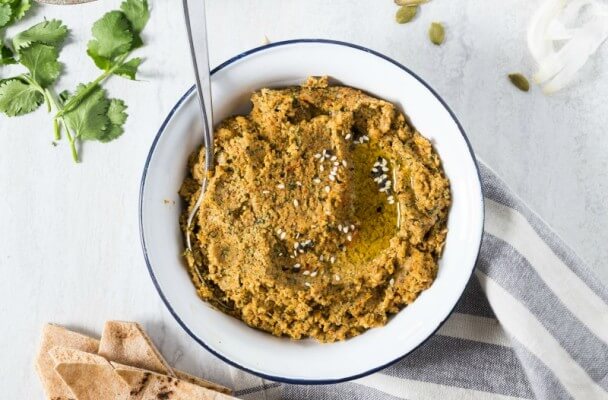
Pumpkin Seed Salsa Recipe
This delectable salsa may not be spicy, but that doesn’t disqualify it from providing the perfect palate for your pita bread or chips. Pumpkin seeds define the dip with a full nutty flavor that is complemented brilliantly by the inclusion of garlic, cayenne pepper, and cilantro.
Ingredients: Pumpkin seeds, tomatoes, garlic, cayenne pepper, olive oil, cilantro, salt.
Total Time: 10 minutes
| Yield: 12 servings
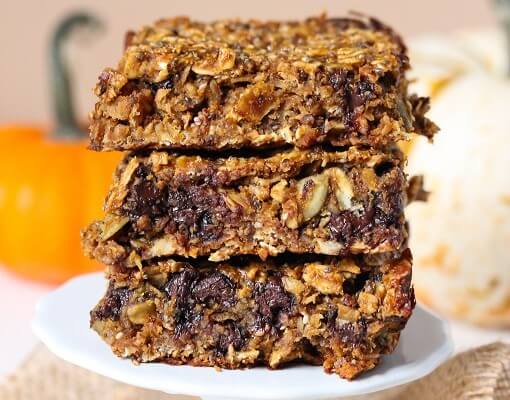
Pumpkin Granola Bars Recipe {gluten-free}
Another collation defined by the particular piquancy of pumpkin, these delectable bars are made with pumpkin puree, spice, and seeds to reproduce the robust relish of the healthsome gourd. The bars offer a source of vitamin A, iron, and protein to help you meet your nutritional needs.
Ingredients: Gluten-free rolled oats, pumpkin puree, cashew butter, honey, maple syrup, dark chocolate chips, pumpkin seeds, chia seeds, pumpkin spice.
Total Time: 45 minutes
| Yield: 8 bars
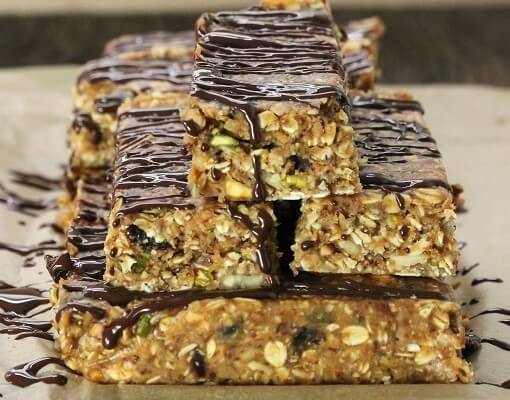
No-Bake Granola Bars Recipe {gluten-free, vegan}
For those seeking the nutritional value of the seeds but would prefer a snack that takes its primary flavor from other foods, these granola bars offer a sweet blend of various nuts, seeds and fruits topped with dark chocolate for a scrumptious taste you’re sure to love.
Ingredients: Gluten-free rolled oats, peanut butter, dried tart cherries, pistachios, flaxseed meal, walnuts, pumpkin seeds, sunflower seeds, agave syrup. unsweetened applesauce, melted cacao nibs or dark chocolate.
Total Time: 15 minutes
| Yield: 8 - 10 servings
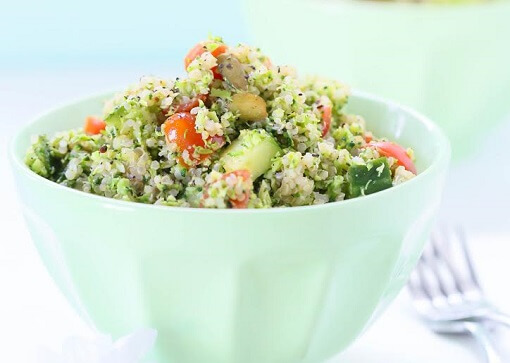
Broccoli Quinoa Salad Recipe {gluten-free}
A well-balanced plate that makes for a complete meal or a satisfying side dish, this salad blends pepitas with the superfoods broccoli and quinoa. The result is a prodigiously nutritious dish with a tangy taste that offers a source of protein, fiber, potassium, vitamin A, vitamin C, and iron!
Ingredients: Fresh broccoli, quinoa, cucumber, cherry tomatoes, raw pumpkin seeds, sea salt, black pepper, Dijon mustard (optional), vinegar, extra virgin olive oil, maple syrup.
Total Time: 1 hour
| Yield: 8 servings
Pepitas and Other Pumpkin Seed Snacks
For a rather robust list of our pumpkin seed products, you can find a full list here. Be sure to also take a look at the top pumpkin seed selections we've included below.
Healthy Eating
- Healthy Snacks
- Healthy Meals
- Healthy Recipes
- Sports Nutrition
- Nutrition and Special Diets
- 21 Day Fix
- 5 Popular Diet Similarities
- Alkaline Diet
- Anti-Inflammatory Diet
- Calorie Counting
- Carb Cycling Diet
- Celiac Disease
- Cholesterol
- Clean Eating
- Crohn's Disease
- DASH Diet
- Detox Diet
- Diabetes
- Diabetes Diet
- Diet Pill Dangers
- Fat Burning Foods
- Gluten-free Diet
- Glycemic Index
- Heart Health
- High Blood Pressure Diet
- High Fiber Foods
- How to Eat Healthy
- How to Lower Blood Pressure
- Hypertension
- IBS Diet
- Ketogenic Diet
- Liquid Diet
- Low GI Foods
- Low-Carb Diet and Foods
- Low-Fat High-Carb Diet
- Mediterranean Diet
- Mediterranean Diet Foods
- Military Diet
- Nutrition Labels Explained
- Paleo Diet
- Raw Food Diet
- Superfoods
- Sustainable Weight Loss
- Thrive Diet
- Vegan Diet
- Vegetarian Diet
- Weight Loss Shakes
- Whole30
- Vitamins, Minerals & Nutrients

